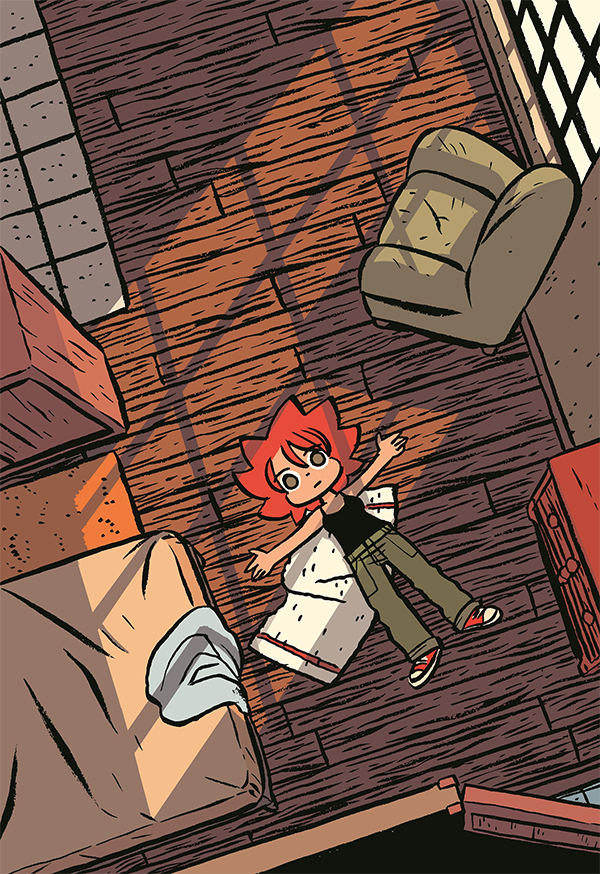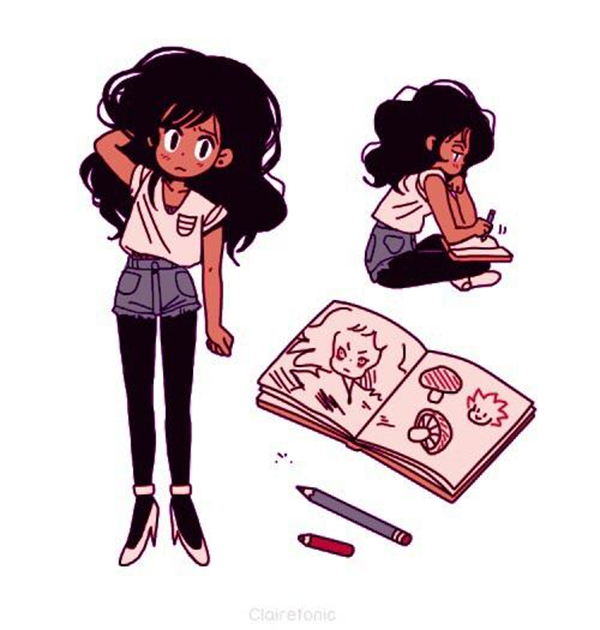The release of Seconds was a long time coming. Between O’Malley taking an artistic break to bask in the glow of his money, and then subsequently breaking his drawing arm halfway through writing the thing, it’s understandable why the book took this long. However, after the slew of pretenders and ripoffs we got in the wake of Scott Pilgrim’s popularity, it’s definitely nice to finally be able to read some new stuff from the man who started it all.
That isn’t to say that Seconds is just more of the same. Tonally, the book is much closer to O’Malley’s other book, Lost at Sea, than it is to Scott Pilgrim. While Pilgrim was essentially an ensemble piece where Scott was the nexus, Seconds is a much more personal story. Seconds focuses on Katie, a chef dealing with old success and new mediocrity. Without spoiling too much, the book takes us through Katie’s fight with stagnation, and the ramifications of her attempts to change her circumstances.
Which leads me to one of my only criticisms of the book. Seconds applies all of its focus to Katie. This is understandable, as her arc is the point of the story, but after reading Scott Pilgrim and having each and every character receive generous amounts of development and fleshing-out, Seconds feels like a bit of a cheat. Everyone aside from Katie can essentially be described in one or two sentences.
At first, I looked to the book’s length as the culprit. At 321 pages, it’s bigger than any one Scott Pilgrim book, but SP had six volumes to fill with side content and minor arcs. Seconds only has this one. But then I considered Lost at Sea, which is a shorter book than even the first SP volume, and yet manages to strike a good balance of one-character focus versus group focus.
In the end, it seems as though this was a conscious decision on the part of O’Malley. Rather than dilute the story’s focus, he chose to look at one individual. While the background characters are definitely underdeveloped, Katie herself is quite possibly the most fleshed-out and real character that he’s ever written.
Scott Pilgrim’s characters essentially evolved from sacks of tropes to actual dynamic individuals as O’Malley’s writing skill improved (in tandem with his art skill, but we’ll get to that in a second). O’Malley applies this approach to Katie as a conscious choice. She starts out within the first few pages as the stock-standard “depressed twentysomething”, but this character framework is filled out very quickly, and she jumps to life by a quarter of the way in.
Katie is the only character to get this treatment, unfortunately. Sure, there’s Hazel, the shy weird girl, but her arc is so minor as to almost be unnoticeable. Whereas Katie seems like an actual person, Hazel seems like an attempt to fill out an “interesting character” checklist. She’s still a better written character than anyone else in the supporting cast, but that’s only because she spends the most time with the protagonist.
The rest of the cast is just window dressing. There’s Max, Katie’s ex, whose name I only remember because his relationship to Katie is a major plot point. There’s the new head chef that Katie is having a fling with, there’s some other people who work in the restaurant, and it falls off from there. In Scott Pilgrim, even the most minor character was memorable. These people merely exist.
This is due to the fact that while characters in Scott Pilgrim had vibrant and memorable introductions, characters in Seconds do not. Everyone is introduced in mostly the same fashion, by their interactions with Katie. A much more organic way to introduce characters than a black text box with their name, age, and ranking, but a bit more flat.
All this criticism is not to say that Seconds is a bad book. Far from it, in fact. The story itself is well-crafted, and extremely gripping once it gets going. O’Malley’s ability to weave a narrative from extremely fine thread is alive and well. Everything falls into place organically, and nothing feels awkward or forced. It’s definitely the some of the best storytelling he’s ever done, and that’s not something I say lightly.
Scott Pilgrim meant a lot to me when I first read it. I could relate to Scott’s struggle with life and personal responsibility as a broke asshole living on his own for the first time, and Seconds relates to my life now in much the same way. Katie is dealing with minor success-turned-complacency, and yearns for something better. Anyone who finds themselves in similar circumstances can get something out of this book. Its lessons are meaningful without being too heavy-handed, and everything is resolved amicably without being too forced. It’s more somber of a book than Scott Pilgrim, but I peg that down to the subject matter, and O’Malley’s evolution as a writer.
On the art side of things, O’Malley’s quasi-manga stylings are back here in full force. The art is vibrant, colorful, and gets the job done. My only criticism of it is that he seems unable to decide between the more detailed style of later Scott Pilgrim books and the slightly simpler, chibi-fied (for lack of a better term) art of his later promotional work and Tumblr leavings. This results in some dissonance, with some characters being portrayed as the former, some as the latter, and some flipping back and forth. This might be pinned down to either the fact that he broke his arm, or the fact that he had an assistant artist on this book. Either way, it’s not especially jarring.
Seconds is a book that was destined for critical acclaim from the moment that it was announced. O’Malley seems to have known this, and created an extremely personal, fulfilling, and wildly different story rather than just cheaply aping his previous work. Seconds doesn’t attempt to cover the same ground as Pilgrim, and doesn’t attempt to have lightning strike twice by following in its footsteps. Rather, O’Malley has shown us that he can do it again on his own terms. I’m definitely looking forward to whatever he puts out next.











